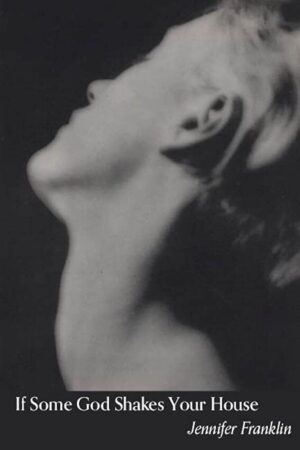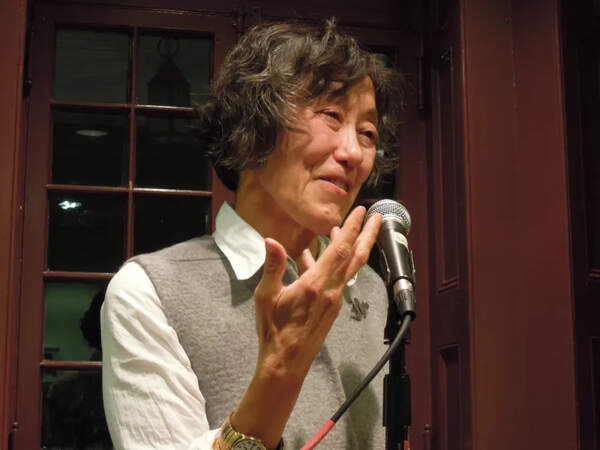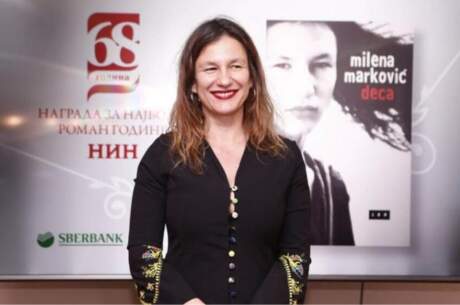Interviews
If Some God Shakes Your House: An Interview with Jennifer Franklin
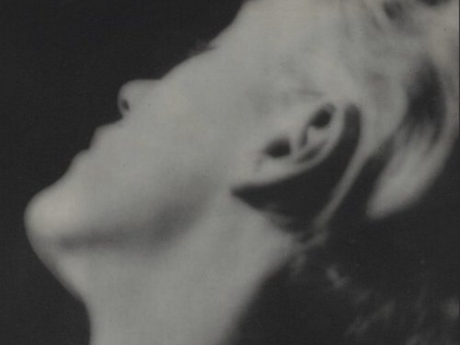
Jessica Jacobs: Reading If Some God Shakes Your House (Four Way Books, 2023), especially in a post-Roe America, is a deeply moving, deeply wise, if often harrowing experience—one I’m grateful to have had. In the book’s end notes, you share that the title is from a line in the chorus of Anne Carson’s Antigonick, her translation of Sophokles’s Antigone: “Blessed be they whose lives do not taste of evil / but if some god shakes your house / ruin arrives / ruin does not leave.” As a series of poems titled “As Antigone—," featuring a speaker who weaves her contemporary life into Antigone’s narrative, creates one of the throughlines of this collection, I’d love to hear what drew you to this story and how it proved so generative for you.
Jennifer Franklin: I am glad to hear that you felt the inextricable connection between the Antigone poems and the prose poems that portray the speaker’s obsession with post-Roe America. I first read Antigone (by Sophocles, as well as the Jean Anouilh version) as a teenager growing up in a traditional Italian-American home. I was deeply moved by her loyalty, her bravery, and above all, her unwavering conviction that one must always do what one feels is ethical even if it’s against the law. I felt an immediate affinity towards Antigone and her devotion to her moral code. My uncle and his boyfriend both have PhDs in European history and they taught me about the Holocaust, including accounts of people who risked their lives to save Jewish people (and others being murdered by the Nazis); so from a very young age, I had an education about how people in power often abuse it.
My daughter was diagnosed with profound autism when she was twenty-five months old and almost everyone around me, especially her own father, wanted me to give up on her. He tried to get me to have another child and put her in an institution. It was then that I truly understood what Antigone had done and why. I understood the way personal sacrifice with those stakes didn’t even feel like a choice but like fate.
JJ: You say this so powerfully in the collection’s final poem, writing of your daughter’s birth, “The moment the nurse // pressed your splotched / body into my arms, / your needs fixed my fate.” Nearly two decades later, after twenty years spent as her sole primary caregiver, was there something specific that moved you to go back and not just examine these moments but write about them with such hardwon honesty?
JF: Although I agree with Sonia Sanchez that, “all poets, all writers are political. They either maintain the status quo, or they say, "something's wrong, let’s change it for the better” I never set out to write an overtly political book before this one. I began writing the Antigone poems after Trump was elected president and I felt driven to use language, the one tool I had at my disposal, to add my voice to the resistance. During Trump’s campaign, election, and inauguration, I was the only parent and caregiver to my severely disabled daughter. I couldn’t even join protests or march on Washington so I decided that I would use the Antigone framework to grapple with both the personal and the political. When Trump was elected, I knew I could write a book about Antigone and Creon that was political and personal—a collection of poems that would address both my own story and protest our contemporary political landscape. As Sophocles wrote, “Oh it's terrible when the one who does the judging judges things all wrong.” I have written about figures from Classical myth and literature in my two previous books. The middle part of my first book, Looming, used the myth of Demeter and Persephone to address the shock and grief of my daughter’s diagnosis. My second book used the myth of Philomela’s rape and brutal cutting out of her tongue by a family member she trusted to confront the treacherous betrayal that caused my tongue cancer. But while those poems were part of other collections that addressed other themes, the sensibility of Antigone permeates every poem of this book, not just the lyrics entitled, “As Antigone.” She is the soul of the book and the poems kept coming, long after I had turned in the final manuscript.
After I had finished the first draft of the book and it was accepted by Four Way, in June of 2020, two friends sent me links to register for The Theatre of War’s online productions of Antigone, including Antigone in Ferguson because they knew about my collection. Their project uses the Classical text to highlight the ills of today’s society—racialized violence, police brutality, systemic oppression, gender-based violence, health inequality, and social justice. Antigone in Ferguson was conceived in the wake of Michael Brown’s death in 2014, through a collaboration between Theater of War Productions and community members from Ferguson, MO. In addition to watching these stunning productions, I read about the founder of Theatre of War, Bryan Doerries, who came to Greek tragedies after caretaking for his partner as she was dying of cystic fibrosis and how, in the aftermath of her death, he was faced with a culture who didn’t want to hear about his grief. For two decades, I have experienced a similar reaction to my grief surrounding my daughter’s suffering except from my close friends, students, and family. Every poem in If Some God Shakes Your House contemplates grief, loss, or death, not just the persona poems in the voice of a contemporary Antigone but the prose poems that describe the speaker bearing witness to the country in the tight grip of the Trump administration and a right-wing Supreme Court but also the memento mori sonnets that examine horrors of climate change, human and animal suffering, and the impermanence of everything, including art. C.D. Wright, one of my professors at Brown wrote, “Poetry is the language of intensity. Because we are going to die, an expression of intensity is justified.”
This is not a quiet book. It is a book of feminist poems that harnesses grief and anger and turns it into art. As Anne Carson wrote in her translation:
dear Antigone,
I take it as the task of the translator
to forbid that you should ever lose your screams
JJ: This brings to mind two moments within your collection’s prose poems. In “July,” you note “Louise Bourgeois writes about her first sculptures—‘At the dinner table when I was very little, I would hear people bickering. To escape the bickering, I started modeling the soft bread with my fingers. With the dough of the French bread—sometimes it was still warm—I would make little figures.’” While in “August,” you write, “I join my daughter’s school trip to the ballet. The dancer grips the stage with her bare feet. She twists her small body into that shape so many times, she convinces herself it doesn’t hurt. That’s what I did when I lived with him—erased my needs until I could no longer ignore the small voice of the hostage inside me.”
In both passages, you describe an artist trapped in a difficult domestic situation. In the first, you show how Bourgeois found escape through her nascent sculptures. In the second, the poem’s speaker is able to more fully see the hidden pain of her past marriage when reflected in the mirror of a dancer’s craft. While I can only imagine the sheer will that allowed you, as you say, to harness grief and anger and turn it into art, what is it in poetry, in art, that helps you give such powerful voice to what was once the erased and ignored “hostage” inside of you?
JF: I think I was very lucky that I had been exposed to books from a very early age. Before I could read, at three, my mother read to me constantly. She grew up in the Bronx and had access to wonderful public libraries so she made sure that my love for books was always nurtured. My middle school library was also a place where I often went during lunch hour and whenever I could get out of gym class. Mrs. Oberson, the librarian, saved all the new books for me and that is where I read Hamilton’s Greek Mythology. I think because the arts always gave me the most solace, happiness, and joy when I was young— reading, watching dance, going to museums (to Philadelphia with my parents and to NYC with my parents when we visited my uncles), it was what I fell back for strength with I was faced with difficulty in my personal life.
For a time after my daughter was diagnosed, I mistakenly thought that I was protecting her by staying in a deeply abusive relationship. I had left my job to focus on my daughter’s extensive home therapy program and getting her to and from her special ABA school an hour away from where we lived. It was while rereading Virginia Woolf’s A Room of One’s Own that I realized that I needed to leave. That what was best for Anna, even if we had very little money, was for me to be alive and safe. “There is no gate, no lock, no bolt that you can set upon the freedom of my mind.”
Throughout my life, whenever I had to grapple with a loss or something difficult, the way I processed it and began to understand it was through art. For me, art has always provided me with a mirror to my own emotional landscape and a way to turn pain into something that could console myself and others. I began writing poetry when my high school newspaper advisor was killed in a car accident at age 26. Nothing but reading, writing, and listening to my favorite albums helped me contend with the stark cruelty of an accidental death of someone so young and so kind.
I recently listened to a podcast called “Death of an Artist” where the art historian Helen Molesworth probes the questions surrounding the murder trial of Carl Andre who was accused and later acquitted in a bench trial of the murder of his wife, the Cuban-American artist Ana Mendieta. This six-episode podcast, which raises many complex and nuanced questions about breaking all the silence that exists, especially in the art world between the artist and the art. She talks about how one of the goals of art is to create a cultural record of internal human experiences that will outlast us. I go back to Virginia Woolf who wrote that “So long as you write what you wish to write, that is all that matters; and whether it matters for ages or only for hours, nobody can say.”
This is why I love Mary Ruefle’s act of keeping a decaying book in her yard to remind herself that all literature is vanity. When I underwent cancer treatment, I read Viktor Frankl’s book, Man’s Search for Meaning and what resonated most with me was his belief that human beings are more well-equipped to get through a devastating or traumatic situation if they have something (anything) that makes their life worth living. Of course, this does not mean that most of the people who were killed during the Holocaust would have been able to live if they had more will. But that, all things being equal, people can often hold on in dire situations if they have something about which they are truly passionate.
JJ: I revisited Frankl during the pandemic and found his theory of a “will to meaning” deeply inspiring, as I do his assertions about the power we each have to choose how we respond to our circumstances. In If Some God Shakes Your House, you write about experiences to which another person might have understandably responded with wordless self-pity, quiet resignation, or even consuming rage. Yet you seem to prove out Frankl’s assertion, in that you make the choice in nearly every poem in this collection not to turn away from the truths of your life, but to mine them for wisdom and find meaning in this practice.
You also spoke of the importance of myths, and I’m wondering how Antigone’s difficult story helped you access your own?
JF: Since I had read several different translations of the play several times and have been carrying around Antigone’s story with me for so many years, it felt natural to enter her story from the angle of her defiance and her deep conviction. I began writing this book after Hilary Clinton lost the election to Donald Trump and the venomous backlash at the #metoo movement. I believed we were living in a time of tremendous misogyny. Men were making decisions for me on both a personal and political level so I was able to access Antigone’s anger, outrage, and sense of ethical conviction. Being a mother of a child with a severe disability is a very isolating experience. Even many people who loved or cared about me deeply couldn’t understand the daily sacrifices and decisions of my daily life. By the time I began writing these poems, I had lived with this kind of profound alienation and isolation for eighteen years. The trait of Antigone that I most identify with is her belief that she doesn’t have a choice. Her loyalty to her brother and her conviction that everyone deserves a proper burial excludes the possibility that she could abandon him to the animals and the elements. I too believe that, as soon as my daughter was born, I had a life-long obligation to do everything I can to ensure her well-being and safety. Antigone’s sister tells her "you are a person in love with the impossible.” Antigone responds, “and when my strength is gone I’ll stop.” That is how I feel about protecting my daughter.
JJ: How do you imagine your own story might accompany and inspire the lives of your readers?
JF: I think the two people I keep going back to on the role of lyric poetry are Stanley Kunitz and Gregory Orr. Kunitz said “It’s the voice of the solitary that makes others less alone.” Orr’s book Poetry as Survival was very important to me after Anna’s diagnosis and my own cancer diagnosis. Reading and writing have always been two of the most important pursuits in my life. They helped me imagine, understand, and empathize with the world outside of my family and my small suburban town. But when I was faced with trying to write about life-changing circumstances, I had to learn a new way to approach poetry that was less academic and more instinctual. In an interview with Image Journal Gregory Orr says, “The making of poems is the making of meanings. To write a lyric poem is to take the confusion and chaos inside you and translate it into words…When you suffer trauma, you mostly do that passively, as a victim. But when you translate that experience into words and shape it, you become active…You’ve redeemed something from that chaos. Writing a poem can save your life, and reading a poem can show you that you are not alone.”
I hope that the way this collection approaches transforming difficult life experiences into poems as well as the use of myth as a way to explore the stories of our collective consciousness that are most relevant to one's own obsessions and concerns, is thought-provoking to some readers. I recently hosted a reading where Claudia Rankine discussed the concept of each of us trying to help create a culture of courage instead of a culture of cowardice. I found that an inspiring aspiration.
Reading and writing poetry is where I find my courage. In digging deeply into the things that scare, hurt, worry, anger, and challenge me, has helped me in invaluable and incalculable ways. When people meet me, if they only know me through my books, they are often surprised by my optimistic and joyful disposition. But I believe that much of what allows me to appreciate and enjoy my life is the ability to grapple with the darker of my emotional landscape. Seneca wrote “Per aspera ad Astra”—through difficulty to the stars. That is my definition of writing lyric poems. The only way that I have been able to find peace and find meaning with inexorable fate is to authentically and thoroughly grieve it. And then to write about that.
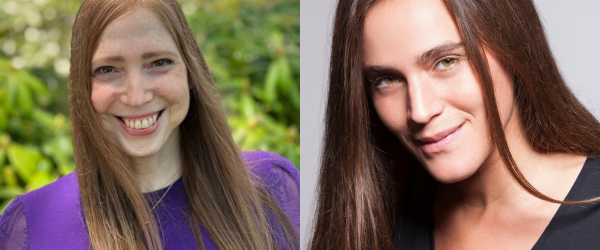
Jennifer Franklin is the author of three full-length poetry collections, most recently, If Some God Shakes Your House (Four Way Books). She is the recipient of a 2021 NYFA/City Artist Corps grant for poetry and a 2021 Café Royal Cultural Foundation Literature Award. Her work has been published widely including in American Poetry Review, Bennington Review, The Nation, and The Paris Review. Most recently, Diane Seuss chose one of Franklin’s poems for The Academy of American Poets “poem-a-day” series. She teaches craft workshops in Manhattanville's MFA program and manuscript revision at the Hudson Valley Writers Center, where she serves as Program Director.
Jessica Jacobs is the author of Take Me with You, Wherever You’re Going (Four Way Books), winner of the Devil’s Kitchen and Goldie Awards; Pelvis with Distance (White Pine Press), winner of the New Mexico Book Award in Poetry and a finalist for the Lambda Literary Award; and Write It! 100 Poetry Prompts to Inspire (Spruce Books/ PenguinRandomHouse), co-authored with Nickole Brown. unalone, her collection of poems in conversation with the Book of Genesis, will be published by Four Way Books in March 2024. She is the founder and executive director of Yetzirah: A Hearth for Jewish Poetry.

